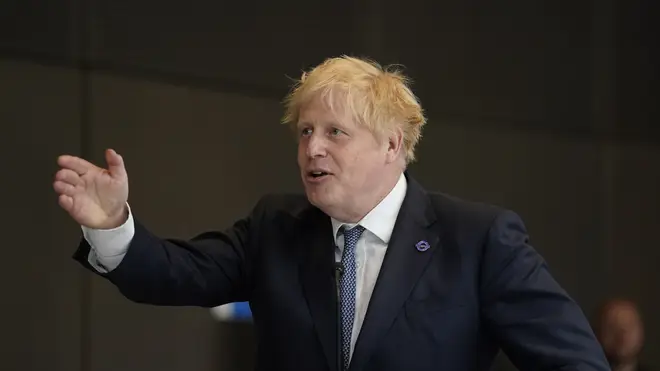
Nick Abbot 10pm - 1am
19 May 2022, 15:04

Downing Street insists Boris Johnson and Rishi Sunak are ‘aligned’ on the controversial levy.
Downing Street has denied blocking the Treasury from imposing a windfall tax on oil and gas giants as the Chancellor faced mounting pressure to help ease the cost-of-living crisis with a new package of support.
The Prime Minister’s official spokesman said he had seen “lots of reports” on division between the departments, but insisted Boris Johnson and Rishi Sunak are “aligned” on the issue.
Labour accused the Government of acting like “headless chickens” on the matter and suggested a U-turn is likely.
Wrangling has continued within the Cabinet over implementing a windfall tax on the profits of oil and gas producers which have benefited from high global prices. The money raised could fund measures to assist with household bills.
Ministers are “intrinsically opposed” to the levy, a senior member of Mr Johnson’s Government said, although it has not been ruled out.
Asked if No 10 is blocking the Treasury from imposing the tax, the PM’s spokesman told reporters: “I have seen lots of reports overnight on this but the Prime Minister and the Chancellor are aligned. You’ve heard them both say effectively the same thing when it comes to these sorts of taxes.
“We want to see significant investment by these sorts of companies into British jobs to grow the economy, to secure our energy supply for the long term. We believe investment is the right thing to do in the first instance.”
Mr Sunak appeared to acknowledge the need for further support for the poorest in a speech on Wednesday night as “right now, we have a collective responsibility to help the most vulnerable in our society”.
But he wants to avoid inflicting further damage on the public finances, which have already been battered by the billions pumped in to the Covid-19 pandemic response, or introducing any stimulus measures which could further increase inflation.
Business leaders urged him to act, with Confederation of British Industry director general Tony Danker telling BBC Radio 4’s Today: “You have to help the hardest hit now.”
Figures this week showed Consumer Prices Index inflation hit 9% in April, but analysts suggested the rate for the poorest households, which spend a higher proportion of their income on food and energy, was more than 10%.
Petrol and diesel prices have continued to reach new highs. The average cost of a litre of petrol at UK forecourts on Wednesday was 168.2p, up from 167.6p per litre on Tuesday.
Data firm Experian Catalist said diesel prices reached an average of 181.0p per litre on Wednesday, up from 180.9p a day earlier.
Labour has argued that a windfall tax could fund a VAT cut on energy bills and an increase in the warm home discount for those on a low income.
The party’s leader, Sir Keir Starmer, told reporters in Leeds it is a “practical step” which is “staring the Prime Minister in the face”.
“I think he’s going to U-turn on this,” he said.
“By dithering and delaying he’s forcing people to struggle when they don’t need to do so.”
He said the Government are acting like “headless chickens” on the matter, sometimes ruling the levy in and sometimes ruling it out.
Sir Keir said after the Government voted down Labour’s bid for a windfall tax in the Commons, the PM has “nothing to say to people who are tossing and turning in their beds, unable to know how they are going to pay their bills”.
The option of the levy is still being considered by ministers, but the oil and gas industry has warned that unpredictable tax policies could deter investment and hit jobs.
Meanwhile, Conservative former Chancellor Norman Lamont called on the Government to return the Universal Credit uplift to ease the cost-of-living crisis for the most vulnerable.
He told BBC Radio 4’s World at One programme: “The top priority must be to give help to the most vulnerable, those who are struggling to feed themselves, to heat their homes, one is hearing daily the heart wrenching stories.
“Although the Government has given considerable help already I think it is clear that a further package will be necessary.
“There is no way the Government can insulate the whole population from an external caused inflation, but I think they ought to do very much what they’ve done before but on a bigger scale.
“I think they ought to do something on Universal Credit, perhaps restore the temporary increase that was then withdrawn, also act on the warm homes discount and widen its scope.”
Asked if Mr Johnson agrees arguments in favour of a “low-tax economy”, as made by Foreign Secretary Liz Truss on Wednesday, do not tally with raising national insurance contributions, the PM’s spokesman said: “Obviously it’s important to look at the overall tax burden.
“I think people understand the rationale as to why we have introduced the levy, which serves two purposes: to fund the NHS, we all know someone who is requiring NHS care at the moment and some of the challenges the NHS has post-pandemic; and it solves the long term problem of adult social care.
“The Chancellor and the Prime Minister are both committed to lowering taxes further when the time allows.”